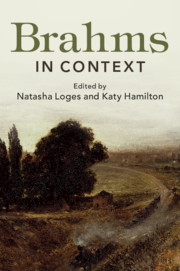Book contents
- Brahms in Context
- Brahms in Context
- Copyright page
- Dedication
- Contents
- Illustrations
- Music Examples
- Notes on Contributors
- Preface
- Abbreviations
- Part I Personality, People and Places
- Part II Identities, Environments and Influences
- Chapter 8 Finances
- Chapter 9 As Pianist
- Chapter 10 As Conductor
- Chapter 11 As Arranger
- Chapter 12 As Editor
- Chapter 13 As Teacher
- Chapter 14 Private Music-Making
- Chapter 15 Concert Life
- Chapter 16 Genre
- Chapter 17 Folk Music
- Chapter 18 Early Music
- Part III Performance and Publishing
- Part IV Society and Culture
- Part V Reception and Legacy
- Further Reading
- Index
- References
Chapter 9 - As Pianist
from Part II - Identities, Environments and Influences
Published online by Cambridge University Press: 15 May 2019
- Brahms in Context
- Brahms in Context
- Copyright page
- Dedication
- Contents
- Illustrations
- Music Examples
- Notes on Contributors
- Preface
- Abbreviations
- Part I Personality, People and Places
- Part II Identities, Environments and Influences
- Chapter 8 Finances
- Chapter 9 As Pianist
- Chapter 10 As Conductor
- Chapter 11 As Arranger
- Chapter 12 As Editor
- Chapter 13 As Teacher
- Chapter 14 Private Music-Making
- Chapter 15 Concert Life
- Chapter 16 Genre
- Chapter 17 Folk Music
- Chapter 18 Early Music
- Part III Performance and Publishing
- Part IV Society and Culture
- Part V Reception and Legacy
- Further Reading
- Index
- References
Summary
Typically for many musicians of his day, Brahms was artistically active in multiple ways, not only as a composer but also as a performer, mainly as a pianist and conductor, piano teacher and director of musical societies. He never perceived himself as primarily a pianist; however, playing the piano – in private and public – was inseparable from his artistic and compositional identity. Schumann remarked on this as early as 9 November 1853 in a letter to the Leipzig publishers Breitkopf & Härtel, to whom he had recommended the young man: ‘his playing is truly a part of his music; I cannot recall hearing such unique sound effects’. Brahms received his initial piano training in Hamburg from Otto Friedrich Willibald Cossel and then from Cossel’s teacher Eduard Marxsen, who had trained in Vienna and who also advised Brahms in composition (Brahms never attended a conservatory) [see Ch. 1 ‘Childhood in Hamburg’].
- Type
- Chapter
- Information
- Brahms in Context , pp. 80 - 87Publisher: Cambridge University PressPrint publication year: 2019

